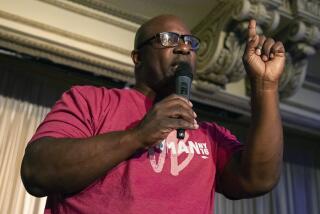Braun’s Star Tarnished by Questions on Ethics : In Illinois Senate race, Williamson is closing the gap as inheritance matter turns ‘crusade into an election.’
- Share via
CHICAGO — For months, Carol Moseley Braun cruised along the campaign trail in Illinois wearing a regal smile and riding the history-making prospect of becoming the first black woman elected to the U.S. Senate.
Aloft in the polls, the cloud of euphoria unleashed by Braun’s upset of incumbent Alan J. Dixon in March’s Democratic primary seemed durable enough to shield her through Election Day.
But as the campaign enters its final stretch, the front-runner has been forced on the defensive by a nettlesome ethics controversy, hounded by allegations that she mishandled her elderly mother’s finances. Braun has been accused of failing to tell government authorities about a $28,750 check her mother received as an inheritance royalty--money that Illinois Medicaid officials might have used to offset the older woman’s expenses in a Chicago nursing home.
Suddenly, Braun’s formidable lead is showing slippage, jeopardizing a campaign that many of her supporters cast as a symbolic crusade to avenge the Senate Judiciary Committee’s harsh questioning last year of Anita Faye Hill over her sexual harassment charges against then-Supreme Court nominee Clarence Thomas.
The furor over Braun’s ethics has jump-started the lackluster campaign of her rival, Republican lawyer Richard Williamson, who depicts her as just another Chicago pol in feminist’s disguise.
Until the ethics furor broke, “she was Joan of Arc,” says Paul Green, a political science professor at Governor’s State University in suburban University Park. “Now, this money thing is humanizing her, making her a mortal again. It’s turned a crusade into an election.”
On Monday, the affair sparked sharp exchanges between the two candidates in a debate. Williamson criticized Braun for “flip-flops” in answering questions about the issue. Braun called Williamson the “Freddy Kreuger of Illinois politics,” referring to the slasher movie character. And she insisted she has “told the people of Illinois and everyone involved that I would make good on any errors or omissions.”
By all indications, Braun maintains a commanding lead. Although a recent statewide Chicago Tribune poll indicated she lost eight percentage points in a week--mostly among voters in Chicago’s Cook County and surrounding suburban counties--the same survey showed she still led Williamson by 46% to 29%.
But her aura of invincibility has wafted away since investigative reports airing on a Chicago television news program questioned her handling of the royalty received in 1989 by her mother, Edna Moseley. Instead of using the check to defray medical costs, Moseley turned the money over to Braun, who deposited it in her own bank account and then portioned it out to herself and family members.
Braun, a lawyer who serves as Cook County recorder of deeds, says she only followed her mother’s wishes. Her story, which has changed several times in retelling, has been greeted skeptically by the Chicago media; one political writer sarcastically dubbed her explanation a “ mama culpa .”
Now under investigation by the state Department of Public Aid, the check controversy has dogged Braun during recent appearances and taken its toll on her poised composure. A Chicago Tribune reporter wrote that during a meeting with the newspaper’s editorial board, the embattled candidate cried during questioning about the affair--an account denied by her campaign manager.
Braun admirers, such as Micaela di Leonardo, a professor of anthropology and women’s studies at Northwestern University, says the affair continues to haunt the front-runner because “it’s the only bit of horse race politics the press has.”
But Di Leonardo concedes that Braun’s own campaign operation has caused damage by “playing her only in terms of her million-dollar-smile and her charisma. She’s an intelligent woman with plenty of smarts on the issues. But you never see that.”
The ethics controversy has leveled new strains on Braun’s campaign staff, an organization already notorious among Illinois political insiders for its internal disarray. Braun has developed a reputation for arriving late to events, and several Democratic regulars have left the campaign, complaining about the autocratic management style of her campaign manager, Kgosie Matthews, a former valet to the Rev. Jesse Jackson.
“Decisions are made and unmade, appearances are missed. It’s not pretty,” says Don Rose, a Democratic political analyst. “But as long as they’re winning, they get the last laugh.”
Far more well known than Williamson, Braun’s name recognition soared as high as 90% in the state after a welter of favorable media stories following her primary win. Appearances on talk shows and even a fashion layout in Harper’s Bazaar magazine added to her luster.
But a race that once verged on a rout is now settling into a classic Illinois pattern--a close contest in which Chicago Democrat and downstate Republican strongholds cancel each other out, leaving the final outcome to suburbanites.
“We’ve always said this would be a dogfight,” says Tim Meyer, Williamson’s campaign manager. “But what the ethics issue does is tell Joe Six-Pack that we have credibility now. Ethnic and suburban voters are taking a second look now.”
To hone that message, Williamson scored something of a coup by wangling an endorsement from Chicago Bears coach Mike Ditka.
A strong voter registration push among black and ethnic white Chicago wards could prove crucial to Braun’s political fate, as Mayor Richard M. Daley launches his novice effort to get out the Democratic vote for a national election.
Jerry Butler, the celebrated 1960s soul singer who now serves as a Democratic Cook County commissioner, says that Daley “wants his machine to be perceived the same way as it was during his father’s day: that Chicago is a maker of kings. This fall, it’s going to make a queen.”
More to Read
Sign up for Essential California
The most important California stories and recommendations in your inbox every morning.
You may occasionally receive promotional content from the Los Angeles Times.













